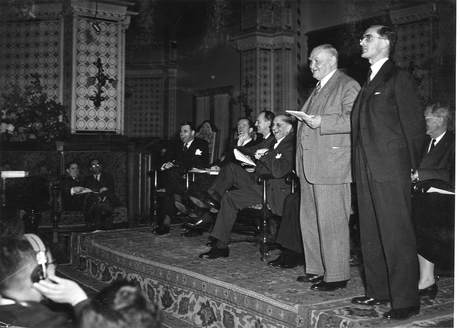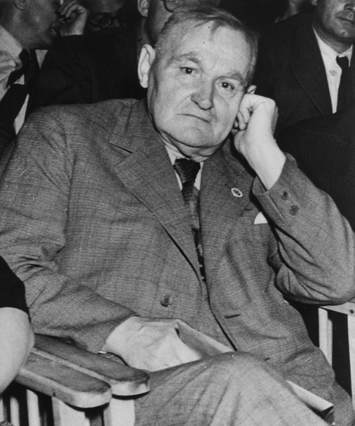The economy of West Germany is admired, envied and sometimes feared as one of the world's 'big three', along with those of Japan and America. Observers have suggested various reasons for Germany's miraculous recovery from the devastation of World War 11 that Germany had the chance to start again from scratch, or the unvindictive policies of the Western Allies, or the capacity for hard work of the German people.
But surely the other reason was the contribution of several outstanding leaders in different walks of life, who at a vital moment, were to receive the help and encouragement they needed. One such man was Hans Böckler, post-war leader of the German trade unions.
Born into a very poor Bavarian family, Böckler became an apprentice gold-leaf beater at 13. He, and later his young wife, worked l2-hour days in unhealthy conditions. When his master locked him out and Hans had to take to the road his passion for social justice was ignited. At night he read for hours - when they could afford oil for the lamp. At 19, he joined the Metalworkers Union and the Socialist Party (SPD), where he used to promote sporting events to enlist young members and create solidarity.
ln 1901, when he became an organiser, trade unions were bitterly persecuted. Many a time his wife, Magdalene, escaped across the border to save the membership files. During the next 20 years of struggle, strikes and war, the Böcklers had to move house five times. When invalided out of the war in 1915, Hans resumed his union work. In 1920 they settled in Cologne, where there was intense suffering in the wake of World War 1. Konrad Adenauer, then Mayor of Cologne, became an unexpected ally and included the SPD in the running of the city.
Hitler destroyed the unions in 1933. Böckler, now an official in the German TUC (ADGB) and an MP since '28, pretended to 'retire'. In fact he went all over the collier helping to create a clandestine network of resistance. He was arrested five times and his house ransacked.
lt was a daunting outlet in 1945. Germany's industries were destroyed, her cities flattened, her people disillusioned. Among them were eight million refugees, mostly from Poland. Thousands of his colleagues had been killed. Böckler was already 70.
However some unexpected developments took place. The British Zone authorities, believing that unions were necessary for the re-establishment of democracy, invited Hans to re-organise them. Jack Tanner of the Engineering Union and Will Lawther of the Miners went over to meet him. They encouraged Böckler to go for industrial rather than craft unions. lt is perhaps ironic that at a time when their own TUC remained archaic and unwieldy, they helped our chief commercial competitor to set up the most efficient labour organisation in the world. It has been described as 'an act of suicidal generosity'. Two years later, Böckler became national chairman of the West German TUC (DGB), with 16 industrial unions in a single federation, solidly financed, not tied to one political party and with none of the craft, political or religious divisions of other Western labour movements.
The other major encouragement came from Böckler's visit to the Moral Re-Armament conference in Caux, Switzerland. Here Adenauer, who had become President of the Parliamentary Council of the three Western Zones, Böckler and hundreds of others met their opposite numbers from many countries.
It was then the only possible place where the leadership of post-war Germany could feel accepted by the international community, experience their support and forgiveness and learn the values essential to the new democracy. In the unique forward-looking atmosphere of Caux, hundreds from Germany and Japan and others who had fought against them, learned the truth about themselves and found hope.
Böckler also saw in the Ruhr evidence of profound changes in aims and attitudes of both management and trade unionists, which led to them finding common goals due to the fresh thinking which came from Caux. He himself became involved so that when Adenauer, as Chancellor now proposed co-determination rather than public ownership, Hans had already proved that it was workable.
In spite of fierce opposition from extreme Right and Left, he became the co-architect, with Economics Minister Erhard, of the social and economic policy of West Germany. German labour accepted the seats on policy-forming boards, in exchange for a system of high wages plus bonuses, high productivity and full social security. Within months the new partnership had been so successful that it paid for the social security benefits that the SPD had wanted for years. In 1959 the SPD formally abandoned the class-war philosophy of their own Karl Marx as the basis of the party.
There was something indestructible about this quiet and generous old pioneer. Böckler's impressive authority came from his life-time of struggle against tyranny, his deep sincerity and from his lack of personal ambition. Before he died in 1951, the big metalworker had seen the triumph of his beloved trade unions. He also found an important truth that had eluded Marx and left a rich heritage to Germany and to us all.
'Some people hold the doctrine that you have to change the system in order to change society,' he said. 'That is of course true, but it is only half the truth . . When men change the structure of society changes and when the structure of society changes, men change. Both go together and both are necessary. The goal which Moral Re-Armament strives to reach is the same as that for which I am fighting as a trade unionist.'
English


